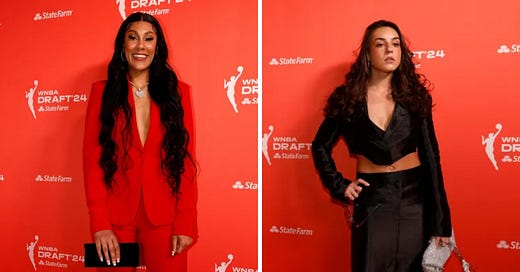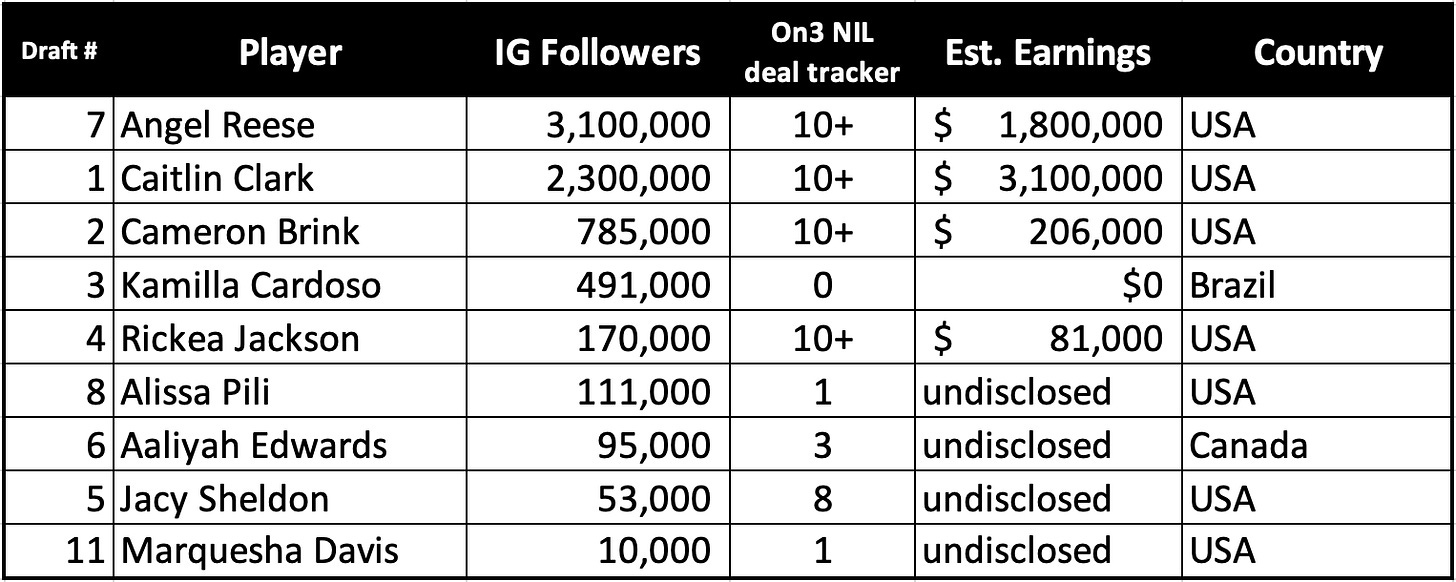Kamilla Cardoso and Nika Mühl: piling up titles, records and followers, but no dollars
International student-athletes are restricted from making NIL money in the United States, it doesn't matter how good they are; and it's even worse for non-Anglo-Americans
The NIL era is here to stay. Ever since the NCAA ruled that student-athletes would be allowed to monetize off their Name, Image, and Likeness, millions (and perhaps billions) of dollars have been poured into kids who, up until three years ago, would be drawing similar dollar amounts for their schools while making… nil.
In these early years of NIL investments, a big chunk has been designated to women’s basketball college players, such as the likes of Angel Reese, Caitlin Clark, Aliyah Boston, Paige Bueckers and Cameron Brink, high profile names who have signed with major brands and, in the case of Reese and Clark, banked way over $1 million in endorsement deals.
After a quick research, I found that of the nine first round picks in the 2024 WNBA Draft who came from the NCAA, eight had at least one endorsement deal tracked by On3. The only one who had none was South Carolina center and third overall pick Kamilla Cardoso.
International student-athletes American Dream can’t go past the court
Cardoso was born in Montes Claros, a small city in the state of Minas Gerais in the Southeast of Brazil, with a population of about 413,500 people. She was brought to the United States at the age of 15 after her current agent, Fabio Jardine, convinced her family of her potential. At 6’7” it didn’t take long for the young immigrant to standout and secure a spot in the starting five of her varsity team at Hamilton Heights Christian Academy (Chattanooga, TN).
At the end of her senior year, Kamilla had set commanding averages of 24.1 points, 15.8 rebounds, 9.2 blocks, and 4.3 assists, and appeared as number 5 in ESPN’s HoopGurlz Recruiting Rankings. The first four? Paige Bueckers, Angel Reese, Cameron Brink and Caitlin Clark, all of whom have racked massive deals through NIL.
When it was time to choose where to go next, Kamilla committed to Syracuse, where she played her freshman year before being scooped by South Carolina’s legendary coach Dawn Staley in April 2021. From then on, Cardoso’s fame only continued to rise, culminating in two NCAA titles and a historical buzzer beater in the 2024 SEC semifinals keeping the Gamecocks alive in the tournament and consequently opened the way for the school’s national championship earlier this year.
A few weeks ago, Cardoso was drafted third overall in the WNBA Draft. Despite being the fourth most-followed on Instagram in that rookie class, she was one of the few popular college athletes who did not make any NIL money due to her immigration status. She was under a student visa, which does not allow for out-of-campus jobs, a major roadblock both to international students and to brands, as kids can’t accept potential endorsement deals and companies can’t offer them.
“Brands don’t come to us and we also don’t pursue them, because both sides know this is an opportunity that we don’t have access to. That being said, we can’t put into numbers how much money [Kamilla Cardoso] lost,” said Jardine to Beta Basket. “The way I could evaluate her potential gains is by comparing what other players of her caliber make, and she would be on the higher bracket of earnings, especially considering her draft placement.”
The same applies to another 2024 draftee standout, UConn guard Nika Mühl, born in Croatia, who has over 376,000 followers on Instagram and was selected seventh overall by the Seattle Storm.
“Brands just see that you're international and they automatically have that wall and don’t want to reach out to you, if that makes sense,” Mühl told Beta Basket. “I'm sure a good percentage of them automatically gives up on international athletes, which is sad."
Nika Mühl also shared her feelings of navigating college and watching teammates closing big deals (Paige Bueckers with Gatorade, Azzi Fudd with Curry Brand…) while she was denied the opportunity to make any money due to her visa status.
“There were definitely times when I was like ‘oh, man, I wish I could do this too,’ because you're looking at it from a different perspective. You have your teammates earning money, and rightfully so, but you're over here working hard and doing your best, however you just don't have the same opportunity,” confessed Mühl, who channeled her energy onto the court, maintaining a positive outlook of the situation.
“If I'm going to be completely honest, it didn't affect me as much as I thought that it would. The main reason is because I never had the opportunity to earn that money so I don't think anything was necessarily taken away from me.”
And indeed, none of that affected her basketball prowess. Far from it. At the end of her collegiate career, Nika Mühl broke several assists records at UConn: career assists (686), single-season assists (284, 2022-23), single-game assists (15, vs. NC State, Nov. 20, 2022) and most double-digit assist games by a UConn Husky (17) (stats provided by UConn). By far not an easy feat, considering the all-time WNBA assist leader, Sue Bird, was part of that program once.
They’re pros now, that means their problems are over… right?
One would think so.
Yes, once international athletes go pro they can close endorsement deals, but they still need to wait for a visa status change, usually from F-1 (student) to O-1, also known as the Individuals with Extraordinary Ability or Achievement visa, which allows non-Americans to enter sponsorship deals while working in the United States. That waiting time can be long though.
Added to that is the fact that international students will have a late start in building relationships with potential business partners, while their peers have the opportunity to establish their names in the market by being available throughout college.
“Having the opportunity to work with brands means that athletes can get their names out there and expand their platform and network,” explained Nika Mühl. “[Student-athletes can] work with these brands and introduce themselves to people that didn't know of women's basketball or them, thus expanding their platform. I feel like that's one thing that I could have done earlier [had I had the chance].”
Caitlin Clark is reportedly close to signing a $28 million contract with Nike. Cameron Brink continues as one of the faces of New Balance’s new era. Angel Reese just announced a new deal with Khloe Kardashian’s Good American. All of that in a little less than a month since they became pros.
Fabio Jardine and Nika Mühl remain hopeful, though, that changes may pave the way for future international student-athletes to benefit from NIL.
“It all depends on the federal government as the NCAA can’t do anything about it. It must change, otherwise kids coming from other countries to play in the United States will keep losing great opportunities. I do believe it’ll change soon.”
The sentiment is shared by Nika Mühl: “Based on what I'm hearing it's already in the works. I know at UConn they were doing their best to bring more attention to that issue, so I'm very thankful to them. I feel like slowly we'll get there.”





